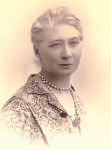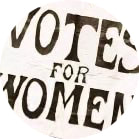 © Museum of London © Museum of London Nora Black was arrested twice between 1910 and 1911. Her first arrest was on Black Friday, November 10th 1911. As discussed previously, all the charges were dropped when the government came under close scrutiny for the way the women were treated. On both of her arrests, Nora gave her address as WSPU headquarters, Clement’s Inn. Nora's second arrest was on November 25th 1911 was for breaking a window at the Privy Council offices to a value of £2 6d. In her defence, she stated that she had taken this action as it was the only form of intelligence the government understood. She was fined 10 shillings plus the cost of repairing the window or seven days in prison. Without an age or address no further information has been found. Charlotte Blacklock was a member of the Chelsea Branch of the WSPU. In the November 19th 1908 edition of Votes for Women, she writes about the members parading the streets of Chelsea “wearing placards of purple, green and white..acting the part of sandwich men.” Born in 1857 in Brighton, Charlotte was the daughter of Joseph and Emma Blacklock. In the 1861 census return, Joseph describes himself as chemist, druggist and soda water manufacturer. In 1876, Joseph died and Emma continued running the business with, as he got older, assistance from her eldest son Philip. Charlotte is not recorded on the census returns as having an occupation until the 1891 where she is stated to be a governess. From thereafter, she does not appear on any census return. It maybe that working as a governess took her to Chelsea. Charlotte was a regular columnist for Votes for Women, reporting on the activities of the Chelsea branch. In the April 23rd 1909 edition, she sets out the arrangements for the Chelsea Art stall and an upcoming visit by Laurence Housman, who co-founded the Men’s League for Women’s Suffrage and was an acclaimed author. Chelsea, at the time, was an artistic world and one that Charlotte was familiar with through her relationship with her cousin, Amy Sawyer, an artist. On March 11th 1912, Charlotte was arrested for her part in a window smashing campaign charged with damaging a window at the premises of Charles Lynton, Piccadilly valued at £6 15 shillings. Her defence informed the court that the value of the window was significantly smaller than that alleged. One hundred and twenty-six women were arrested having caused, an alleged, £4000 of damage. Charlotte was sentenced to four months imprisonment, a harsh sentence for a first offence. She went on hunger strike and was force fed. The WSPU awarded her a hunger strike medal which is now part of the collection at the Museum of Australian Democracy along with a portrait painted by her cousin Amy Sawyer. Charlotte moved in 1918 to Ditchling, Sussex. She died in 1931. Violet Bland , known as Annie, was born in 1863, the eldest child of William and Violet. The family lived in the village of Bayston Hill, a few miles south of Shrewsbury, Shropshire, where her father worked as a labourer. As was often the way, Violet left home and was employed as a kitchen maid at Dudmaston Hall about thirty miles from her family home. Violet was hard working. She moved to Cirencester, Gloucestershire, and opened a guest house at 24 Victoria Road and then a boutique hotel at Gloucester House, a Queen Anne property. Ultimately, Violet owed three properties, two of which she rented out, before selling up and moving south. No trace of Violet can be found until the early 1900s, when she opened Henley Park Grove, a substantial house, as a Ladies College of Domestic Science, to the north of Bristol. In advertisements, the strap line was: Home for Health and Culture. Lectures were often given by the Secretary of the Vegetarian Society. One advertised event was a Christmas party, running from December 23rd 1904 to January 9th 1905, which included classes in hygienic cooking and food values for a cost of 35 shillings a week, this rose to 2 guineas a week if Swedish gymnastics and dancing classes were required. Lectures were to be held on subjects such as Uric Acid in Relation to Health, or How the Vegetable World replaces the Animal World. By 1906, Violet was no longer advertising the Ladies College but, instead, was offering first class board and lodgings complete with tennis and croquet. Advertisements highlighted the property was heated in the winter and there was a gymnasium. Around this time, Violet joined the WSPU in Bristol. Lillian Dove Wilcox was also a member and was arrested in 1909 for being part of a deputation to the House of Commons. She was sentenced to one month in prison and went on hunger strike. When her release date was known, the women of the Bristol WSPU organised a reception committee to meet Lilian and Mary Allen, another released suffragette, off the train and accompany them, in a procession, to Violet’s house where refreshments were provided. One of the guests of honour was Annie Kenney who addressed the reception and, along with Violet, presented the ex-prisoners with leather belts with silver buckles. Violet spoke of the public spirit and endurance shown by the women. In the Western Daily Press, dated August 27th 1910, an advertisement was placed, selling off furniture and effects from the house, including twenty-one beds and over fifty chairs, which indicates the size of the house. Not long afterwards, Violet moved to London and opened a boarding house, in central London, at 22 Old Burlington Street, Piccadilly. Violet was first arrested for her part in Black Friday, when the government subsequently dropped the charges. Her second arrest, in March 1912, was alongside Ethel Baldock. They were jointly accused of breaking a window, worth £10, at the Commercial Cable Company in Northumberland Avenue. Violet was sentenced to four months and was removed to Aylesbury Prison. In the July 5th 1912 edition of Votes for Women, Violet described being force feed “They pinched and clutched my nose unmercifully …. and I did not rise quickly from the chair … they snatched the chair from under me, and flung me on the floor…. There is no doubt whatever about the attacks being made with the object of breaking us down… They twisted my neck, jerked my head back.. but pour it [the food] into one’s stomach .. They expect .. to perform the whole operation in two minutes. There were always six or seven to one..” After, her release, Violet continued to run her West End boarding house campaigning for the vote. She died in 1940.
0 Comments
Leave a Reply. |
Categories
All
|
Proudly powered by Weebly


 RSS Feed
RSS Feed
